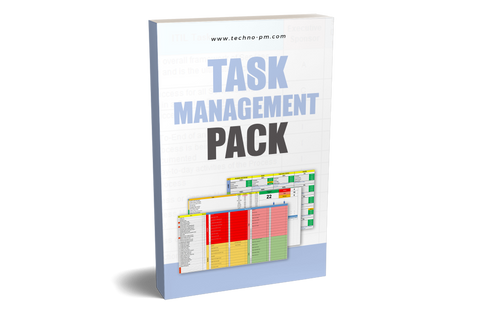Task Management Demystified: How To Prioritize, Organize, and Succeed
Introduction
Task management refers to the process of overseeing, organizing, planning, and tracking tasks and activities within a project or daily workflow. It involves structuring tasks, assigning responsibilities, setting deadlines, prioritizing, and monitoring progress to ensure the timely completion of goals and objectives. Effective task management plays a crucial role in the success of any project or organization. With so many tasks to juggle and deadlines to meet, it can be easy to feel overwhelmed and lose sight of important priorities.

Purpose of Task Management
The primary purpose of task management is to provide structure and clarity to individuals and teams in their daily work. By breaking down complex projects into smaller, actionable tasks, it becomes easier to prioritize and allocate resources effectively. Task management also helps in setting clear expectations and defining goals, which is essential for effective collaboration and coordination within teams.
Task management also plays a vital role in meeting deadlines. By setting realistic deadlines and tracking progress, individuals can stay on top of their tasks and avoid delays. This reduces the risk of missed deadlines and improves overall organizational efficiency. Additionally, task management allows for effective time management, enabling individuals to allocate appropriate amounts of time to each task. This helps prevent time-consuming tasks from overshadowing other important responsibilities.
6 Key Principles For Effective Task Management
By following these principles, you can optimize your workflow and accomplish your goals more efficiently:
1. Set Clear Goals: The first step in effective task management is to set clear goals. When you have a clear focus and know exactly what you want to achieve, you can prioritize your tasks accordingly.
2. Prioritize Tasks: Once you have defined your goals, it's important to prioritize your tasks. Not all tasks are created equal, and some are more important or urgent than others. Use a prioritization matrix or a to-do list to categorize your tasks based on their importance and deadlines.
3. Break Tasks into Smaller Steps: Large tasks can be overwhelming and can lead to procrastination. To avoid this, break down your tasks into smaller, manageable steps. Create sub-tasks or action items for each project, and schedule specific times to work on them.
4. Use Time-Management Techniques: Time management is a crucial aspect of task management. Learn and utilize effective time-management techniques such as the Pomodoro Technique or time blocking. The Pomodoro Technique involves working in short bursts of focused activity, followed by short breaks.
5. Delegate and Collaborate: Effective task management does not mean doing everything yourself. Learn to delegate tasks to others if possible. If you have a team, distribute tasks based on individual strengths and skills. Effective collaboration can also improve task management, as it facilitates the sharing of ideas, resources, and responsibilities.
6. Review and Reflect: Regularly review your tasks and reflect on your progress. Assess whether your current strategies are effective or if any adjustments need to be made. Take note of any bottlenecks or distractions that hinder your productivity and find ways to overcome them.

Tools and Techniques for Task Management
1. Task Management Tools:
- Asana: Enables teams to organize tasks, set deadlines, and track project progress through boards and lists.
- Trello: Uses boards, cards, and lists for visual task management, ideal for small teams and individual use.
- Jira: Geared towards software development, it helps in tracking bugs, issues, and agile project management.
2. Task Management Techniques:
- Eisenhower Matrix: Prioritizes tasks based on urgency and importance, dividing them into four categories: urgent & important, important but not urgent, urgent but not important, neither urgent nor important.
- Kanban Methodology: Kanban Utilizes boards and cards to visualize workflow stages, allowing teams to see work progress and manage tasks effectively.
- Agile Project Management: Agile Iterative approach breaking tasks into smaller, manageable parts, promoting adaptability and flexibility.
- Pomodoro Technique: Involves working for a set time (usually 25 minutes) followed by a short break. After several cycles, take a longer break. Helps in maintaining focus and managing time effectively.
Delegation and Collaboration In Task Management
Delegation and collaboration play vital roles in task management, as they allow for the efficient distribution of workload and foster a spirit of teamwork among individuals. Effective delegation ensures that responsibilities are assigned to the most suitable individuals, whereas collaboration promotes effective communication and coordination between team members.
Delegation is the process of assigning tasks and responsibilities to individuals who possess the necessary skills and expertise to perform them effectively. It involves identifying the strengths and weaknesses of team members to optimize productivity and ensure the efficient allocation of resources. Proper delegation is crucial as it allows managers to focus on strategic decision-making and higher-level tasks while entrusting operational activities to capable team members.
Collaboration in task management offers numerous advantages. First and foremost, it promotes creativity and innovation. When individuals with diverse perspectives and expertise collaborate, they bring forth a variety of ideas and solutions that can help overcome challenges and drive innovation. Collaboration also improves problem-solving and decision-making, as multiple viewpoints are considered, leading to more informed and effective outcomes.
To effectively delegate and collaborate in task management, it is essential to establish clear goals, roles, and expectations. Managers should provide adequate guidance and support to team members, ensuring they have the necessary resources and information to fulfill their responsibilities. Regular communication and feedback sessions are crucial to address any challenges or concerns and provide recognition for a job well done.
Conclusion
In conclusion, effective task management is crucial for maximizing productivity and achieving goals. By implementing a comprehensive task management system, individuals and teams can prioritize tasks, set deadlines, allocate resources, and track progress. With the right tools and strategies in place, task management can streamline workflows, increase efficiency, and ensure successful project completion. Embrace the power of effective task management and unlock your full potential for success.



